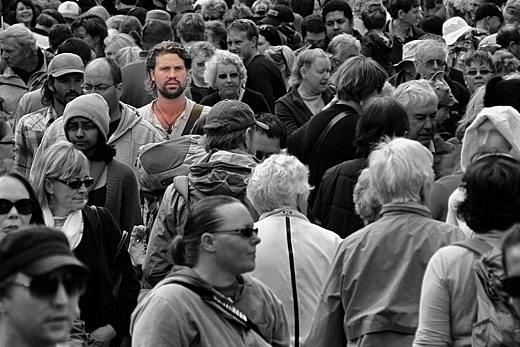By Mark Naea on 18 June 2012 in Island Breath -
(http://islandbreath.blogspot.com/2012/06/kiuc-must-treat-all-equal.html)

Image above: Photo of "A Face in the Crowd" by Paul S. Allen (paulusthebtir) . From (http://www.flickr.com/photos/paulusthebrit/6854611523/lightbox/).
"KIUC agrees that it will not seek to install (including but not limited to requesting from the Hawaii Public Utilities Commission ("PUC") permission or authorization to install a smart meter on premises where the electricity accounts are in Plaintiff's name), and will not voluntarily install without court order or an order or determination of the PUC, any smart meters on premises where the electricity accounts are in Plaintiff's name without Plaintiff's permission."
“The terms of the settlement apply only to Mr. Asquith.”
KIUC seems to believe that it has the authority to make rules and settlements with individual Co-op members, creating in essence a privileged class of haves and have-nots.
This is in direct opposition to the statements made by KIUC to Mr. Asquith. Adam Asquith is quoted to have said:
“KIUC admitted that they cannot offer me (Adam) a special deal and these new conditions must be offered to all members under their PUC regulations.”
KIUC has also stated on its website:
“The settlement provides to Mr. Asquith the same assurance KIUC gives to those who fill out a deferral form”
The KIUC deferral form contains no such terms or assurances as those stipulated within the “Settlement Agreement” with Adam.
The word “deferral” is defined as -the act of putting off to a future time or date. Though KIUC has verbally said it is an indefinite deferral, the term “indefinite” is not on the “Deferral Form” itself. In fact, the deferral form makes no mention on any binding agreements with the co-op member.
The deferral form is not a legally binding document. It is a one sided agreement by KIUC to KIUC, that grants co-op members “a wish to defer”, while implying through vague and official sounding language that KIUC can obtain cost recovery at some future date.
There is a clear difference between the “settlement agreement” with Adam Asquith and KIUC's deferral form. The “settlement agreement” grants legal rights to Adam, one of them being “no installation of a smart meter without his permission first”, with no mention of any cost recovery.
That last sentence forms the basis of several significant points of departure that sheds further light on the charges brought against KIUC.
KIUC filed a “motion to dismiss” Adam’s lawsuit in Federal Court, in an effort to derail his lawsuit on privacy. At the first hearing, KIUC was told that the “motion to dismiss” was to be denied, and KIUC withdrew the motion before it was ruled upon.
KIUC agreed that they did not want it to go to trial and agreed to meet Adam’s demand for an opt-out in writing. This was agreed upon at the first hearing on the injunction where the judge severely admonished KIUC.
The judge also made it clear that she found even the idea of having to pay a fee to retain privacy in your home reprehensible and she better not see it in her court if that action is made. And that is why no mention of any cost recovery fees are found in the “settlement agreement” between KIUC and Adam Asquith.
Not only are co-op members being discriminated against on their rights to equality, co-op members are also being stripped of their rights to legitimate and legal protection provided by Adam’s “settlement agreement”.
The action that Mark Naea has initiated has brought to light KIUC’s attempted discriminatory stance. It has also revealed how KIUC has trampled upon the constitutional rights of authority and ownership of one’s home and property and the right to privacy in that home.
KIUC has stated on its website:
The “Settlement Agreement” between Adam Asquith and KIUC is a legally binding document, recorded in Federal Court and approved by a Federal Judge.Adam’s “settlement agreement” with KIUC upholds our right to privacy in our own home, our right to choose without fear of corporate or governmental circumvention, and the individual rights of authority and ownership of one’s home and property.
Adam stood up for his rights in Federal court, and in so doing, stood up for all of us. The “settlement agreement” that KIUC wrote and legally agreed to upholds those rights. Yet, KIUC would have us believe that we are without such protections.
It is discrimination to give special treatment to one co-op member and not others; it is discrimination to force co-op members to pay for such special treatment in the form of court fees and litigation; and finally, it is discrimination to give false assurance to one class of co-op member while another is protected by special dispensation.
KIUC has done all three, and continues to do so. In light of Adam Asquith’s settlement and Mark Naea’s PUC Formal Complaint, KIUC can no longer hide its agenda to curtail co-op members’ legal rights and protections.
See also:
Ea O Ka Aina: Clarification on KIUC Ruling 6/17/12
Ea O Ka Aina: KIUC Opt-In or Opt-Out Fiasco 6/16/12
.
No comments :
Post a Comment